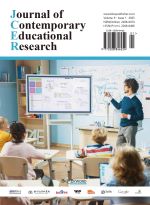Abstract
The research topic of the author’s PhD dissertation is “The Impact of Motivation Cultivation on English Autonomous Learning among University Students in Hunan, China—A Mediating Role of Learning Strategy.” Within this topic, three key variables are identified: the dependent variable (DV), the independent variable (IV), and the mediating variable (MV). Specifically, the DV refers to English autonomous learning, the IV refers to motivation, and the MV refers to learning strategy. The research establishes that the MV (learning strategy) is an integral component of information processing theory (IPT). Consequently, the dissertation incorporates integrative and instrumental motivation theories alongside IPT as its foundational theoretical framework. This paper aims to explore the theoretical framework of the PhD dissertation in detail, focusing on the interplay of these three theories.
References
Agustin W, Yudi Wahyudin A, Isnaini S, 2020, Language Learning Strategies and Academic Achievement of English Department Students. Journal of Arts and Education, 1(1): 19–29.
Barrnett S, 2009, Motivation and Language Learning: The Role of Enthusiasm and Drive in Achieving Fluency. Journal of Language and Motivation, 15(3): 123–145.
Amoah S, Yeboah J, 2021, The Speaking Difficulties of Chinese EFL Learners and Their Motivation Towards Speaking the English Language. Journal of Language and Linguistic Studies, 17(1): 56–69. https://doi.org/10.52462/jlls.4
Anggarista S, Wahyudin AY, 2022, A Correlational Study of Language Learning Strategies and English Proficiency of University Students at Efl Context. Journal of Arts and Education, 2(1): 26–35.
Azar AS, Tanggaraju D, 2020, Motivation in Second Language Acquisition among Learners in Malaysia. Studies in English Language and Education, 7(2): 323–333. https://doi.org/10.24815/siele.v7i2.16506
Bureau JS, Howard JL, Chong JXY, et al., 2022, Pathways to Student Motivation: A Meta-Analysis of Antecedents of Autonomous and Controlled Motivations. Review of Educational Research, 92(1): 46–72. https://doi.org/10.3102/00346543211042426
Darvin R, Norton B, 2023, Investment and Motivation in Language Learning: What’s the Difference? Language Teaching, 56(1): 29–40. https://doi.org/10.1017/S0261444821000057
Filgona J, Sakiyo J, Gwany DM, et al., 2020, Motivation in Learning. Asian Journal of Education and Social Studies, 10(4): 16–37. https://doi.org/10.9734/ajess/2020/v10i430273
Fishbach A, Woolley K, 2022, The Structure of Intrinsic Motivation. Annu. Rev. Organ. Psychol. Organ. Behav., 9: 339–363. https://doi.org/10.1146/annurev-orgpsych-012420-091122
Howard JL, Bureau J, Guay F, et al., 2021, Student Motivation and Associated Outcomes: A Meta-Analysis from Self-Determination Theory. Perspectives on Psychological Science, 16(6): 1300–1323. https://doi.org/10.1177/1745691620966789
Jamila M, Zubairi AM, 2022, A Systematic Review of Autonomous Learning in ESL/EFL in Bangladesh: A Road to Discovery Era (2009-2022). English Language Teaching, 15(4): 47. https://doi.org/10.5539/elt.v15n4p47
Gardner RC, Lambert WE, 1972, Attitudes and Motivation in Second-Language Learning, Newbury House Publishers, Rowley, MA.
